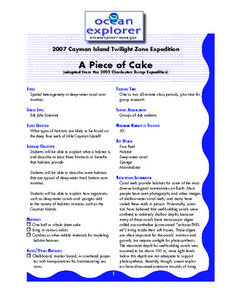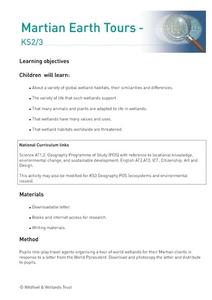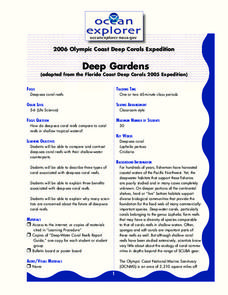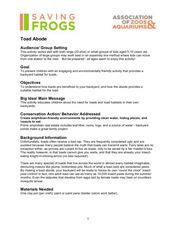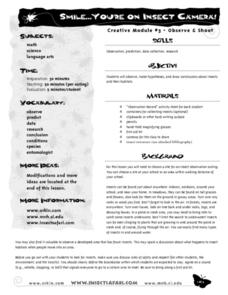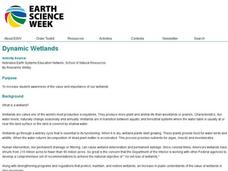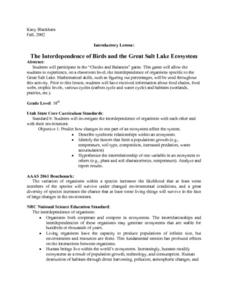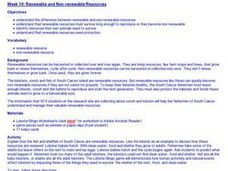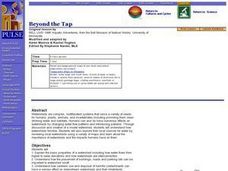Curated OER
A Piece of Cake: Ocean Communities
Students explain habitats. In this model based lesson plan students create a model to help describe a habitat that is typical of deep-water. Students will describe how organisms such as coral and sponges add to their habitat.
Curated OER
Martian Earth Tours
Students study a variety of global wetland habitats, their similarities and differences. They examine the variety of life that such wetlands support and determine that many animals and plants are adapted to life in wetlands, that...
Curated OER
Pond Life
Students recognize the habitats of animals that live near or in a pond. In this pond lesson, students examine pond water and look for pond organisms. Students observe organisms with a loupe and complete a worksheet.
Curated OER
Deep Gardens
Students investigate the differences and similarities between shallow-water and deep-sea coral reefs. In this coral reef lesson, students research and compare the characteristics of reefs. Students describe various lifeforms...
Curated OER
Building an Underwater Habitat
Students investigate underwater habitats. In this underwater habitat lesson, students study Aquarius and design their own underwater habitat that can sustain life. Students work in groups and present their habitats to the class. Students...
Curated OER
Toad Adobe
Students explore the importance of toads and the need for toad habitats in the environment. In this animal habitats lesson, students create an adobe habitat for toads by using a clay pot. Students paint their pots and place them in their...
Curated OER
Smile...you're on Insect Camera!
Students study insects. They go on an outdoor insect outing and look for insects in a variety of places--in the air, under rocks, on leaves, in water, etc. They record information about the insects they find, including habitat, weather...
Curated OER
Pea Soup Ponds
Students perform an experiment where they learn how water can be polluted by algal bloom. They grow algae with different concentrations of fertilizers or nutrients and analyze their results.
Curated OER
Deep Gardens
Learners compare and contrast deep-sea coral reefs with shallow-water coral reefs. In this underwater ecology lesson, students describe three types of coral and explain why scientists are concerned about the future of deep-sea coral.
Curated OER
Dynamic Wetlands
Students construct and observe a model of two different types of wetlands. In this wetlands lesson, students create a model of a wetland with constant drainage and a wetland that maintains a well-saturated soil. Students observe and...
Curated OER
The Journey of the Pacific Salmon
Students examine the journey of the Pacific salmon. In this salmon species instructional activity, students review the stages of the salmon life cycle and conduct an experiment to determine how the water and habitat changes during each...
Curated OER
Managing the Everglades Ecosystem
Students explore the Everglades ecosystem using the Internet. To develop a picture about conservation of resources in the context of the Everglades. Explore relationships between species and habitats. Develop an idea of how human beings...
Curated OER
The Interdependence of Birds and the Great Salt Lake Ecosystem
Tenth graders participate in the "Checks and Balances" game. This game lets them experience the interdependence of oragnisms specific to the Great Salt Lake. They recieved informaton about food chains, food webs, trophic levels various...
Curated OER
Aquatic Ecosystems
Students study the diversity of marine life and their habitats. In this aquatic ecosystems instructional activity students complete a lab activity and experiment.
Curated OER
Renewable and Non-renewable Resources
Students play Lobster Bingo on a provided worksheet. This game demonstrates how human activities and natral events affect lobsters by impacting their food, clean water, and shelter of the reef.
Curated OER
Growing plants
Students explore plants and recognize that they are living things that require light and water to grow; students identify, name and match the parts of plants.
Curated OER
Tracking Narwhals in Greenland The Ocean Unicorn
Young scholars study the ecology, habitats, geographic range and feeding habits of narwhals. They determine at least three reasons for the decline in the narwhal populations and complete the accompanying worksheets.
Curated OER
Garden of Eden
Students view a video clip about animals and their habitats. They work together to discuss how different animals adapt to their environments. They create a new habitat for a specific animal and draw new adaptations for them.
Curated OER
Reversible and irreversible changes
Students experiment with solids and liquids to find which solids will dissolve in water. This dissolution and mixtures instructional activity can be completed online or in class as all materials are connected to the lesson plan for both...
Curated OER
No Escape
Via four student handouts, marine biology learners examine the topography and circulation cell of the Fieberilng guyot. Then they examine the number of individual hydroids counted at each depth. Pupils use the information to relate water...
Curated OER
ProjectWILD Aquatic: Migration Headache
Learners explore the important factors that affect habitat quality and the associated survival of migratory water bird populations. They discuss an organisms dependency upon a variety of habitats and habitat quality. Students play a game...
Curated OER
Mission: Project Rescue
Third graders explore animals and their habitats. Using the Internet, they gather information and determine which animal goes into which habitat. Students design travel containers to provide proper food, water and comforts for the animal.
Curated OER
DID YOU HELP CREATE THIS
Students examine whether their actions are positively or negatively affecting organisms and their habitats. They choose an animal to study then create a multimedia presentation including charts and graphs of data logger information and...
Curated OER
Beyond the Tap
Students explain the basic properties of a watershed including how water flows from higher to lower elevations and how watersheds are interconnected. They comprehend how the placement of buildings, roads, and parking lots can be...
Other popular searches
- Animals Water Habitats
- Animal Water Habitats
- Land or Water Habitats
- Shallow Water Habitats
- Water Habitats Lesson Plans
- Describe Water Habitats
- Water Habitats Rivers


